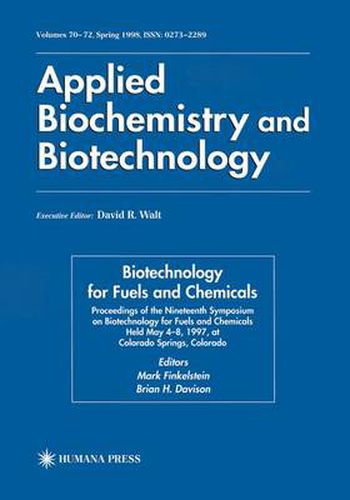Readings Newsletter
Become a Readings Member to make your shopping experience even easier.
Sign in or sign up for free!
You’re not far away from qualifying for FREE standard shipping within Australia
You’ve qualified for FREE standard shipping within Australia
The cart is loading…






MARK FINKELSTEIN National Renewable Energy Laboratory BRIAN H. DAVISON Oak Ridge National Laboratory The proceedings of the 19th symposium on Biotechnologyfor Fuels and Chemicals, held in Colorado Springs, Colorado, May 4-8, 1997, had over 200 attendees. This meeting continues to provide a unique forum for the presentation of new applications and recent research advances in the production of fuels and chemicals through biotech nology. The utilization of renewable resources, and in particular cellulosic biomass, has broad implications in today’s world of green house gases, global warming, ozone layers, climate change, energy sustainability, and carbon emissions. It also has relevance to the chemical industry’s continuing need to both lower current chemi cal production costs and produce novel chemicals. Biotechnology and bioprocessing are now making it possible to convert this bio mass to fuels and chemicals in a commercially attractive fashion. The 19th Symposium captures a wide range of technical topics from an academic, industrial, or government perspective. A vari ety of biomass feedstocks are discussed in Session 1, along with several updated and innovative pretreatment processing approaches. The ability to turn lignocellulosic materials into simple sugars offers great opportunities to generate cost-effective feed stocks to be used in biotechnological processes for the production of fuels and chemicals. Through the advent of genetic engineering, the development of a series of exciting new biocatalysts and microbes were presented in Session 2.
$9.00 standard shipping within Australia
FREE standard shipping within Australia for orders over $100.00
Express & International shipping calculated at checkout
MARK FINKELSTEIN National Renewable Energy Laboratory BRIAN H. DAVISON Oak Ridge National Laboratory The proceedings of the 19th symposium on Biotechnologyfor Fuels and Chemicals, held in Colorado Springs, Colorado, May 4-8, 1997, had over 200 attendees. This meeting continues to provide a unique forum for the presentation of new applications and recent research advances in the production of fuels and chemicals through biotech nology. The utilization of renewable resources, and in particular cellulosic biomass, has broad implications in today’s world of green house gases, global warming, ozone layers, climate change, energy sustainability, and carbon emissions. It also has relevance to the chemical industry’s continuing need to both lower current chemi cal production costs and produce novel chemicals. Biotechnology and bioprocessing are now making it possible to convert this bio mass to fuels and chemicals in a commercially attractive fashion. The 19th Symposium captures a wide range of technical topics from an academic, industrial, or government perspective. A vari ety of biomass feedstocks are discussed in Session 1, along with several updated and innovative pretreatment processing approaches. The ability to turn lignocellulosic materials into simple sugars offers great opportunities to generate cost-effective feed stocks to be used in biotechnological processes for the production of fuels and chemicals. Through the advent of genetic engineering, the development of a series of exciting new biocatalysts and microbes were presented in Session 2.